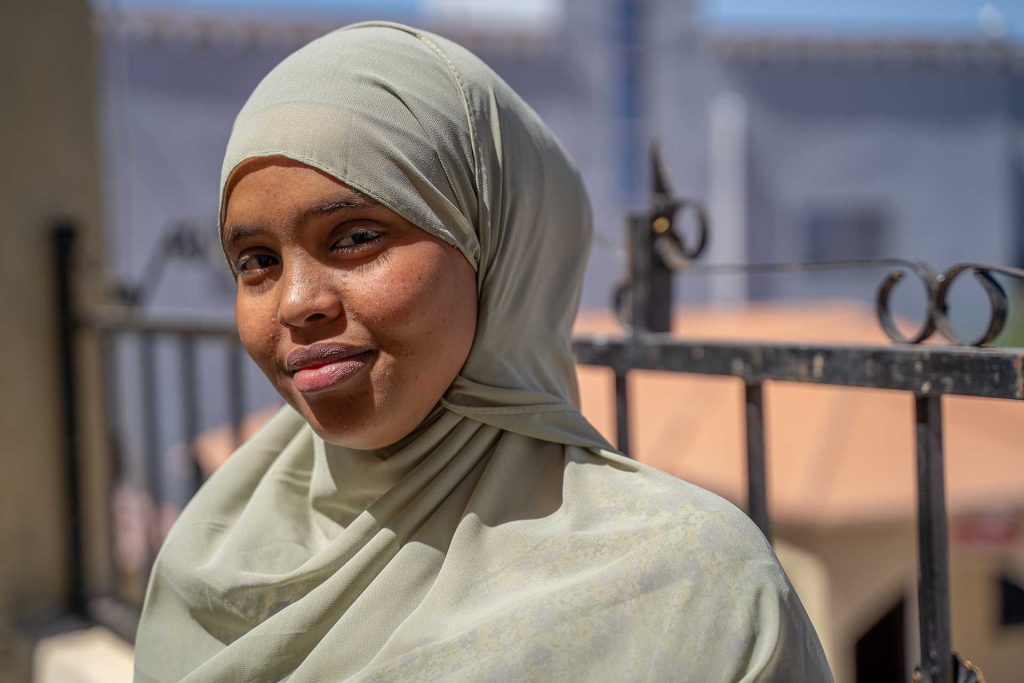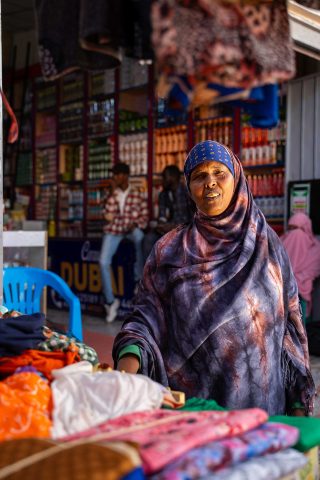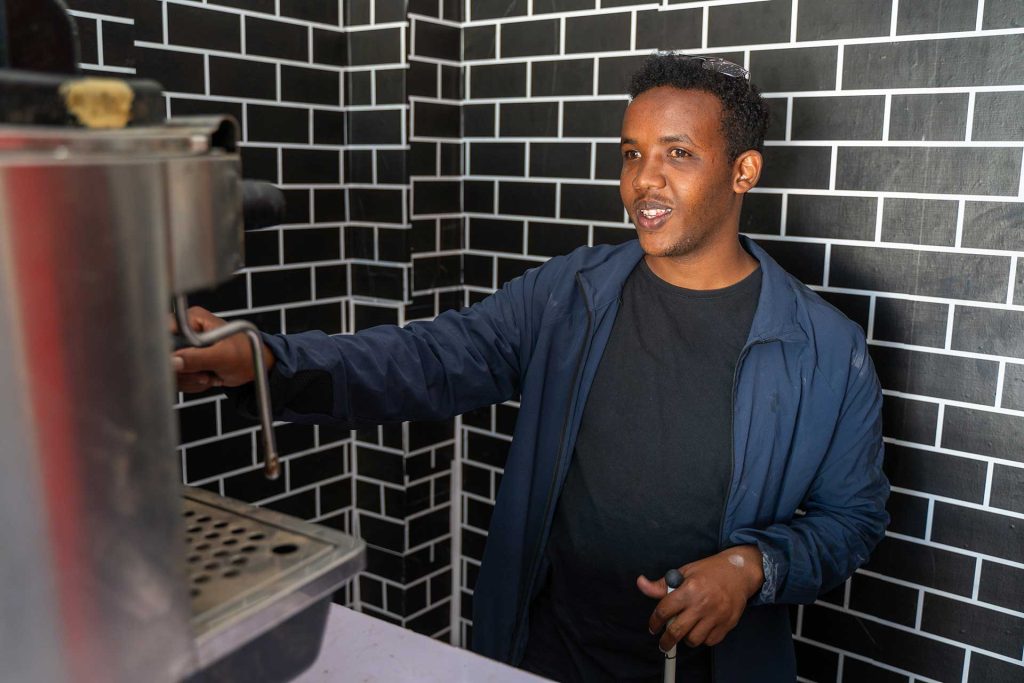Start-up money helps young entrepreneurs in Somaliland
Hibak markets the clothes she designs on social media, Sakariya’s café invites customers for coffee and books. Seed money also helps Sainab, who lost her business in a devastating fire. This is how FCA is supporting livelihoods in Hargeisa, Somaliland.
Text and photos: Björn Udd
More than 60 per cent of young people are unemployed in the northern part of Somalia, which is known as Somaliland. The country, which has suffered from decades of conflict, lacks sufficient jobs, which is why even educated young people are often left with no options. Youth unemployment is particularly urgent in the region, as approximately 70 per cent of the inhabitants of Somaliland are children and young people.
A workplace provides an important livelihood, and not only for the employee. Since so many people are without income, a single employed person in Somaliland can support up to twenty family members.
Making a living signicantly improves people’s future prospects, so FCA is focusing on supporting young people who want to become entrepreneurs in the city of Hargeisa. Having your own income also eases the position of women and the disabled, because with a regular salary they have better opportunities to plan their own lives. Those who dream of entrepreneurship, however, often lack the necessary funds and accounting skills to start a business. FCA bridges the gap by offering free training and start-up grants.
But young people are not the only group that needs support in Hargeisa. In April 2022, the large market of Waheen burned to the ground, and with it, the savings, warehouses, and business premises of an estimated 2,000–5,000 merchants turned into ashes. The ravages of the fire and global inflation completely crippled the city’s economy. While there were no deaths, damages from the fire amounted to around $2 billion US Dollars, or up to 60% of Somaliland’s GDP.
After the fire, FCA gave twenty female entrepreneurs €500 cash relief, which has enabled them to restart their operations.
In this story, we meet three small entrepreneurs from Hargeisa: two of them are young people at the beginning of their working careers, and the third represents a more experienced generation of merchants.
Hibak Hiis Mohamoud is a 23-year-old tailor who markets her clothes on social media.
“When I started the tailoring course, the others had already been in school for two months. There was no more room on the school bus. I walked to school for an hour and a half every day. Finally, the teachers realised that I was serious and gave me a place to study,” says Hibak Hiis Mohamoud.
Excuduing self-confidence and activity as she recounts the stages of her life, Hibak explains that her father did not want anything to do with his family. That decision caused difficulties in many ways, but also to study, because her mother had a low income and school fees were high. Once Hibak called her father and asked him to pay the school fees, but he refused.
“So I then sold my only possessions, the earrings, at the market. With the money, I bought school books and fruit for my mother,” Hibak says.

First, Hibak studied to be a midwife, but when no work could be found, she decided to switch to a tailoring course organised by FCA. Hibak followed fashionable women on social media, whose style she began to imitate in her own collection. However, acquiring new customers was difficult.
“I wore the clothes I made and went to cafes so that others could see what kind of clothes I make. I was asked where I bought my clothes. That’s how I found customers”, Hibak laughs.
Today, Hibak makes not only clothes but also bags. She markets his products on social media and there are enough buyers from Somalia’s capital, Mogadishu. Hibak sends clothes by post and receives payments from customers using a mobile application. Currently, she earns about $60 US Dollars a month.
“At first, my mother didn’t give me permission to go to the course because I already had training as a midwife. Now she sees how I bring home money, and encourages me to continue,” says Hibak.
“All my life I have been dependent on others, but now I have become an independent woman.”
Even the relationship with her father has changed with education.
“When my father heard that I had become a seamstress, he became my customer. I want my father to see that it was a mistake to abandon us.”
Sainab Abdi Farah is an experienced market seller who revived her shop after a devastating fire.
“The fire started on Friday, my day off. I was at home and when I heard about the fire, I rushed to the scene. The whole store was on fire. When the fire burned out, I had lost everything.”

Sainab sadly tell us about the day that changed everything in her hometown of Hargeisa. On the first day of April in 2022, the market was destroyed across an area of almost ten hectares. In one day, people’s savings, livelihoods and the city’s own economic prospects all disappeared.
“It was terrible. I don’t get support from anyone, and my husband has been sick for a long time,” says Sainab, whose entire family of 11 depend on her income.
Sainab’s husband has back problems and needs surgery. According to Sainab, the treatment costs 18,000 dollars, and since healthcare in Somaliland does not work well, the surgery should be done abroad.
“Right now, all I have left is hope. I want to expand my business and make enough money to support my family.”
After the fire, Sainab was allowed to sell her goods on the steps of a shop set up in a former warehouse. She kept her merchandise in a small box. However, the business was so small that it was impossible to live on the income.
“I received $500 from FCA and a week-long merchant training so that I could get my business up and running again. Without support, it would have been impossible for me to expand my business.”
Now, instead of a small box, Sainab has a whole cart of merchandise, such as clothes, scarves and more. She still has permission to sell on the steps of the shop.
“We help each other. My products go well with the store’s products. I sell women’s and children’s clothes, and they sell hair and skin care products,” says Sainab.
But business is still difficult. A large part of the marketplace is still under construction, and customers have not found their way back.
“In a good month, I make about $70. Before the fire, I earned up to $200,” says Sainab.
“All of us here hope that things will go back to normal.”

20-year-old entrepreneur Sakariya Ali Isack has been blind since the age of 3.
“We are establishing a fast food cafe. We sell specialty coffees, teas, fried chicken and french fries,” enthuses Sakariya Ali Isack.
The café is still being renovated. Building materials lying around the business premises. The rush to get it finishes is intense, because in a few days ‘Books and Coffee’ will open its doors to the public. Shelves will offer books that customers can read while drinking coffee.
Sakariya and three friends used $4,000 start-up money, provided by FCA, for rent, decorating, purchasing coffee and deep-frying machines and food supplies. The café receives books that have already been read once as donations.
“I take care of administrative tasks, cleaning and also some of the catering. I can serve most of the products, but, for example, telling soft drinks apart from each other is tricky,” says Sakariya, who is blind.
He tells us that becoming an entrepreneur has brought a lot of advantages with it even before the café opens. According to Sakariya, people with disabilities are discriminated against in the local culture. He has even been attacked by strangers.
“In high school, even the teachers asked why I was there. I had to convince myself that I’m smart, I ended up teaching Braille to the teachers. However, the bullying never completely stopped.”
In addition to the start-up money, Sakariya has attended training organized by FCA, which teaches, for example, accounting, data processing and market research.
“These skills will be very useful. I hope to soon earn enough to support my family and siblings.”
Sakariya also dreams of starting her own family. He is engaged and will be married later this year.
“My fiancé is also blind. I don’t know if it will cause problems in the future, but we understand each other well, and I think that’s the most important thing.”